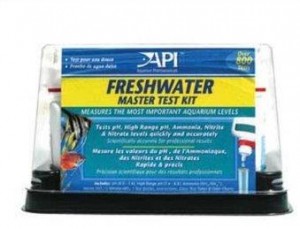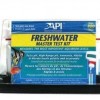Testing your aquarium is the key component to maintain a healthy environment for your fish. You must be wondering, what should you test. The list below will definitely help you sort what to test for, and provides information about the available products.
Master Test Kits:
Combination or Master Test kits are touted as the perfect way to have all the tests you need on hand. The pro of buying a combo kit is lower cost per test, everything has a same expiry dates and it is quick and easy to purchase and keep the basic tests all at once. The disadvantage of master test kits is that you cannot customize your tests, you get what is in the kit. The kits tend to run out of one item long before the others. We would recommend you to keep a master kit on hand with pH, ammonia, nitrite and nitrate, preferably a liquid variety instead of strips.
Amazon has Master test kits available on their online store. Over 800 test are available. Kit includes laminated color card, 4 test tubes and holding tray.
Ammonia Test Kits
An ammonia test kit is one of the must haves for every aquarium owner. The primary issue is the fact that ammonia can be present in an non-ionized form NH3, or the ionized form NH4 known as ammonium. While NH3 is the concern, most of the tests give results for the total of NH3 and NH4. Most ammonia test kits on the market give you only the total ammonia value. Seachemt kits reliably test for both total and NH3, however the kits cost more than the types that test only total ammonia. Seachem also produces in tank ammonia alert products which are generally good, but are not as reliable as actual liquid test kits.
Nitrite Test Kit
Nitrite is another test that is important during the start up of a new aquarium, as well as on an ongoing basis to catch problems before they are serious. Once you have your tank well established, it is recommended to test monthly for nitrite and anytime a fish is sick or dies. Liquid test kits are preferred.
Nitrate Test Kit:
Nitrate is not dangerous for your fish, but high levels may stress them, leaving them susceptible to diseases, and short lifespan. Low nitrate levels are must while breeding fish. Elevated nitrates also cause more algae growth. It is better to track nitrate levels regularly in your aquarium. Nitrate tests are often included in master test kit, and available separately also.
pH Test Kit:
pH is a key parameter for all aquariums, and should be tested and recorded in a log on an ongoing basis. Sudden changes of pH can cause fish disease and death. While using strips, take care to seal the strips well and don’t touch the pads on the strips with your fingers.
Hardness Test Kit:
Hardness refers to the levels of dissolved minerals, is not commonly tested, though. However, it has a direct impact on the stability of pH and the species of fish that will thrive in the tank. Two types of hardness test are available, KH or carbonate hardness, and GH, or general hardness. KH is referred to as alkalinity or carbonate hardness and is the measure of carbonate and bicarbonate in the water. The higher the KH, the more stable your pH will be. GH measures the dissolved magnesium and calcium. GH should be matched to the species of fish you are keeping. Most tetras generally do best in soft water while most cichlids thrive in hard water. GH is particularly important while breeding fish.
Phosphate Test Kit:
This test is mostly used in saltwater aquariums. Phosphate is a key factor in algae growth. Knowing the phosphate levels will help you determine and battle algae problems.
Oxygen Test Kit:
Oxygen is rarely tested in aquariums. Densely populated tanks and densely planted tanks require closer examination of oxygen levels. Warm water holds more oxygen than cold water, and fresh water holds more oxygen than salt water.
Iron Test Kit:
Iron is present in trace amounts in aquarium water. Plant require iron to thrive and heavily planted tanks or breed plants require iron testing.
Copper Test Kit:
Copper tests are used only in situations where copper is used to treat sick fish. Copper test kits are hence purchased when giving copper treatments.




















